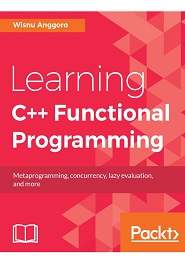
English | 2017 | ISBN: 978-1787281974 | 304 Pages | PDF, EPUB | 18 MB
Apply Functional Programming techniques to C++ to build highly modular, testable, and reusable code
Functional programming allows developers to divide programs into smaller, reusable components that ease the creation, testing, and maintenance of software as a whole. Combined with the power of C++, you can develop robust and scalable applications that fulfill modern day software requirements. This book will help you discover all the C++ 17 features that can be applied to build software in a functional way.The book is divided into three modules—the first introduces the fundamentals of functional programming and how it is supported by modern C++. The second module explains how to efficiently implement C++ features such as pure functions and immutable states to build robust applications. The last module describes how to achieve concurrency and apply design patterns to enhance your application’s performance. Here, you will also learn to optimize code using metaprogramming in a functional way.
The book is divided into three modules—the first introduces the fundamentals of functional programming and how it is supported by modern C++. The second module explains how to efficiently implement C++ features such as pure functions and immutable states to build robust applications. The last module describes how to achieve concurrency and apply design patterns to enhance your application’s performance. Here, you will also learn to optimize code using metaprogramming in a functional way. The book is divided into three modules—the first introduces the fundamentals of functional programming and how it is supported by modern C++. The second module explains how to efficiently implement C++ features such as pure functions and immutable states to build robust applications. The last module describes how to achieve concurrency and apply design patterns to enhance your application’s performance. Here, you will also learn to optimize code using metaprogramming in a functional way.
By the end of the book, you will be familiar with the functional approach of programming and will be able to use these techniques on a daily basis.
What You Will Learn
- Get to know the difference between imperative and functional approaches
- See the use of first-class functions and pure functions in a functional style
- Discover various techniques to apply immutable state to avoid side effects
- Design a recursive algorithm effectively
- Create faster programs using lazy evaluation
- Structure code using design patterns to make the design process easier
- Use concurrency techniques to develop responsive software
- Learn how to use the C++ Standard Template Library and metaprogramming in a functional way to improve code optimization
Resolve the captcha to access the links!